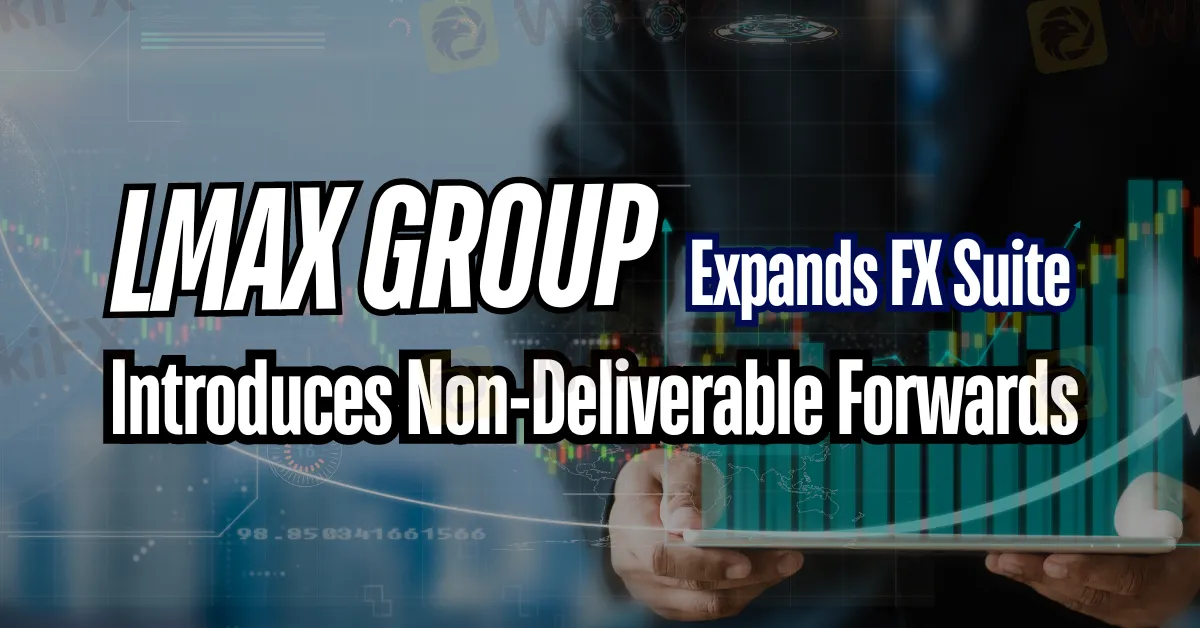简体中文
繁體中文
English
Pусский
日本語
ภาษาไทย
Tiếng Việt
Bahasa Indonesia
Español
हिन्दी
Filippiiniläinen
Français
Deutsch
Português
Türkçe
한국어
العربية
LMAX Group Expands FX Suite: Introduces Non-Deliverable Forwards
Abstract:LMAX Group, a provider of institutional trading venues for foreign exchange (FX) and digital assets, has substantially enhanced its FX product suite with the introduction of Non-Deliverable Forwards (NDFs), addressing the escalating demand for such instruments, notably in the Asia Pacific region.

LMAX Group, a provider of institutional trading venues for foreign exchange (FX) and digital assets, has substantially enhanced its FX product suite with the introduction of Non-Deliverable Forwards (NDFs), addressing the escalating demand for such instruments, notably in the Asia Pacific region.

Non-Deliverable Forwards (NDFs) represent specialized financial instruments utilized within foreign exchange markets, closely resembling traditional forward contracts with a crucial deviation: the currencies involved cannot be physically delivered upon maturity. In an NDF agreement, two parties commit to exchanging one currency for another at a predetermined exchange rate (the “forward rate”) at a future date. Unlike standard forward contracts, the actual exchange of currencies does not occur upon contract expiry. Instead, settlement transpires by offsetting the difference between the agreed-upon exchange rate and the prevailing spot exchange rate at the time of settlement. The party owed money receives the difference in cash. NDFs prove particularly beneficial in environments characterized by currency exchange controls or restrictions, such as emerging markets, or where regulatory constraints exist. They serve as a critical tool for hedging against currency risk, allowing businesses operating in volatile currency markets to secure exchange rates for future transactions. Additionally, NDFs offer avenues for speculation, appealing to investors and traders seeking to capitalize on anticipated movements in currency exchange rates. Overall, Non-Deliverable Forwards provide a pragmatic means for parties to manage currency risk and conduct transactions in markets where traditional currency exchange may be impeded or impractical.
The newly launched NDFs by LMAX Group will be available for trading on two key LMAX Exchange matching centres: Singapore (SG1) and London (LD4). This follows the successful acquisition of a Recognized Market Operator (RMO) license from the Monetary Authority of Singapore (MAS) by LMAX Exchange in November 2023.

The exchange operates on a central limit order book (CLOB) model, fostering transparent price discovery and execution for a diverse range of market participants, including banks, non-bank institutions, proprietary trading firms, brokers, asset managers, and other buy-side entities.
Matt DellaRocca, Head of Liquidity and Analytics for APAC at LMAX Exchange, highlighted the advantages for local market participants, emphasizing access to a deeper pool of NDF liquidity through a regulated exchange platform. The CLOB model further ensures an efficient market structure, facilitating transparent, precise, and consistent execution.
This initiative aligns with LMAX Group's dedication to expanding its FX offerings globally, with a particular focus on serving customers in the Asia Pacific region. Initially, the launch prioritizes this region, addressing the growing demand for FX NDFs and institutional liquidity, and is anticipated to contribute to the overall enhancement of the FX market structure in the area.
The initial product offering encompasses major Asian currency pairs against the US dollar (USD), including the Indian Rupee (INR), South Korean Won (KRW), New Taiwan Dollar (TWD), Chinese Yuan (CNY), Indonesian Rupiah (IDR), Philippine Peso (PHP), and Malaysian Ringgit (MYR). LMAX Exchange plans to introduce LATAM currency crosses in the future.
The launch has received positive industry feedback. Paul Buttenmueller, Global Head of eFX Trading at UBS, acknowledged the significance of this development, citing LMAX Exchange's NDF offering as a pivotal step forward in solidifying Singapore's position as a crucial hub for FX price discovery. This initiative is expected to enhance market access to local pricing for Asian emerging market currencies, ultimately fostering liquidity and propelling NDF volume growth.

Disclaimer:
The views in this article only represent the author's personal views, and do not constitute investment advice on this platform. This platform does not guarantee the accuracy, completeness and timeliness of the information in the article, and will not be liable for any loss caused by the use of or reliance on the information in the article.
Read more

The Daily Habits of a Profitable Trader
Every professional trader follows a structured approach to ensure they are well-prepared, disciplined, and able to seize opportunities with confidence. Whether you are a seasoned investor or an aspiring trader, adhering to a robust daily checklist can significantly enhance your performance. Use this checklist to check if you are a qualified trader

The Impact of Interest Rate Decisions on the Forex Market
Interest rate changes determine currency attractiveness, influencing capital flows and exchange rate trends. Understanding this mechanism helps investors navigate the forex market effectively.

How a Housewife Lost RM288,235 in a Facebook Investment Scam
A 47-year-old housewife in Malaysia recently fell victim to an online investment scam, losing a substantial sum of RM288,235 after engaging with a fraudulent scheme advertised on Facebook.

A Trader’s Worst Mistake: Overlooking Broker Reviews Could Cost You Everything
In today’s digital age, reviews influence nearly every decision we make. When purchasing a smartphone, television, or home appliance, we pore over customer feedback and expert opinions to ensure we’re making the right choice. So why is it that, when it comes to choosing an online broker where real money and financial security are at stake many traders neglect the crucial step of reading reviews?
WikiFX Broker
Latest News
The Withdrawal Trap: How Scam Brokers Lure Victims into Paying More
FCA to Investors: Think Twice Before Trusting These Brokers
Trump\s tariffs: How could they affect the UK and your money
Trump gambles it all on global tariffs he\s wanted for decades
TradingView Brings Live Market Charts to Telegram Users with New Mini App
Trump tariffs: How will India navigate a world on the brink of a trade war?
Interactive Brokers Launches Forecast Contracts in Canada for Market Predictions
Authorities Alert: MAS Impersonation Scam Hits Singapore
Stocks fall again as Trump tariff jitters continue
IG Group Acquires Freetrade for £160M to Expand UK Investment Market
Currency Calculator







